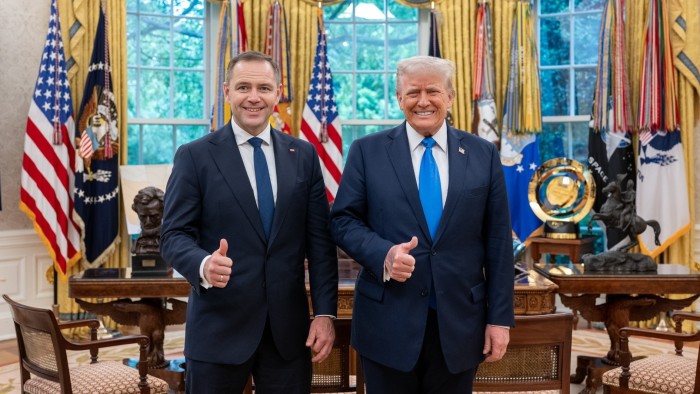Unlock the White House Watch newsletter for free
Your guide to what Trump’s second term means for Washington, business and the world
The writer is editorial director and a columnist at Le Monde
On two different occasions over the past few weeks, I have heard former top Biden administration officials make a surprising plea to Europe: America is in trouble and it is your turn to stand up for democracy.
This would certainly be fair, even though there is some irony in Americans wishing for outside help rather than mounting resistance at home — after all, the Democratic party is neither dead nor outlawed. But Europe may have a hard time coming to the rescue since it is itself a target of Donald Trump’s assault on liberal democracy, as recent election campaigns in Romania and Poland have shown.
Three weeks ahead of the Nato summit 2025, the talk among European officials all derives from the obsessive fear of American disengagement from the continent. Will Trump withdraw US troops from Europe? How many? When? From which countries? Will a commitment from member states to spend 5 per cent of their GDP on defence, to the obvious benefit of the American arms industry, satisfy this unpredictable hegemon? Will the transatlantic alliance survive?
With Russia’s war against Ukraine in the background, these questions are legitimate. But they miss the real point. The biggest threat the US president poses to Europe is not the withdrawal of troops or equipment — it is regime change. Trump will not quit Nato; “death by a thousand cuts” is a more plausible outcome, according to a former US diplomat.
What the president and his cronies are doing to American democracy — undermining its institutions, normalising corruption, instilling fear in its intellectual elites, chasing immigrants, intimidating judges, insulting foreign leaders in the Oval Office — is far more dangerous. As Italian political scientist Nathalie Tocci puts it: “The real Trumpian shock is not abandonment, it is betrayal.”
The transatlantic alliance is supposed to be based on shared values. If Washington redefines those values and turns them against its allies, they will inevitably feel betrayed. This is what happened when vice-president JD Vance in February accused Europe of “retreating from its most fundamental values”, including free speech, and lectured its leaders about this “threat from within”.
This is also what happened last week when Marco Rubio’s state department published a text entitled “The Need for Civilizational Allies in Europe” by its “Bureau for Democracy”. “Europe’s democratic backsliding . . . increasingly affects American security”, it warned. “On both sides of the Atlantic, we must preserve the goods of our common culture, ensuring that western civilization remains a source of virtue, freedom and human flourishing.”
Suddenly, the principles underpinning western civilisation have different meanings on either side of the Atlantic. What Rubio calls “tyranny in disguise” is, in the eyes of the German government, plain “democracy”. Where Vance sees a “threat from within”, many European leaders see a threat from the US. In a “values-based alliance”, this is a problem.
Historians may point out that Europeans and Americans have had disagreements over values before. What is different this time is not only the extent to which the Trump administration seeks to transform the American political system, but also the fact that his team, notably his vice-president, wants Europe to follow the same path.
This offensive is launched at a time when many governments in Europe feel vulnerable because of the rise of far-right parties. They see this trend as their own “threat from within”, while for Trump’s operatives, it is a formidable tool to push the Maga agenda in Europe. “Now the leader of this movement is in the White House,” laments a Spanish official. “For us, this is a game-changer.”
Poland’s centre-right government has watched with dismay as Washington took a close interest in its election. Trump hosted the nationalist candidate Karol Nawrocki in the Oval Office two weeks before the first round last month. Then, just five days before the second round, with polls promising a very close contest, Kristi Noem, US homeland security secretary turned up at an event in Poland to support Nawrocki, who narrowly won the election on Sunday.
Success is not guaranteed. In Romania, the candidate supported by Trump failed to get elected last month. Some European far-right politicians feel uneasy about being associated with an unpopular American president.
Beleaguered European democrats have some hard work to do. America is in trouble, but before they can help they must put their own house in order.







